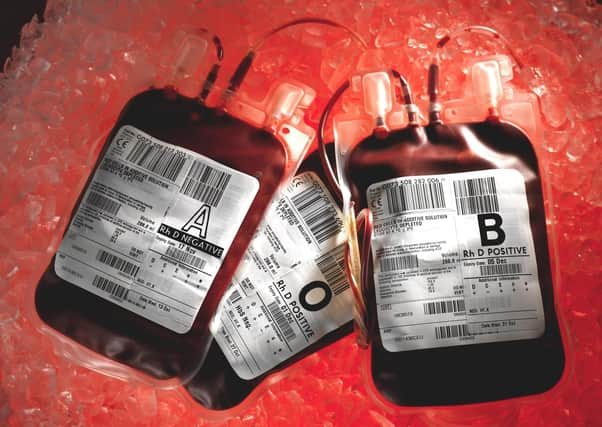Coronavirus: Bloodbank staff and donors ‘do not need masks because they do not have the virus’


A senior manager at the service stressed that they are following World Heath Organisation (WHO) guidance on the matter, after a nurse and a donor both took to the airwaves yesterday to vent their concerns.
The bloodbank manager said that they have to take it “at face value” that none of the donors or staff are carrying Covid-19 without showing symptoms.
Advertisement
Hide AdAdvertisement
Hide AdThe Nolan Show yesterday broadcast a segment in which a nurse (speaking anonymously) said: “It’s very frightening going out every day and there’s upwards of 100-odd people coming in, every single day.
“We have aprons and gloves, and that’s it... What we’re asking for is masks and visors – something akin to that.”
In addition, a would-be blood donor phoned the show to say they had attended a blood bank, but then walked out when they realised the staff had no masks.
The News Letter contacted the blood transfusion service, and in response to queries it send a densely-written series of WHO medical guidelines.
Advertisement
Hide AdAdvertisement
Hide AdOne of the managers directed this reporter to the following paragraphs within that: “It is not necessary for precautions taken in health care settings with sick patients to be applied to donor centres unless the donor centre is sited within hospital premises or there is evidence of their effectiveness in community settings.”
The manager said their donation facilities are not in hospitals, but are in community halls and suchlike.
She also said the virus cannot be passed on via blood transfusions.
She went on to say: “Our staff are only told to report to work if they are fit and well and healthy and don’t have any symptoms. So the workforce is healthy.
Advertisement
Hide AdAdvertisement
Hide Ad“People coming to sessions are triaged, so only fit and healthy people get past the triage where we ask about Covid-19, who they’ve been in contact with, if they’ve had it, and also if they have their temperature checked.
“So everyone who gets through to the donation area is actually fit, well and healthy.
“So as you can see from the WHO guidance, face masks are not required.”
It was put to them that both donors and staff could be carrying the virus, unbeknownst to themselves or anyone else.
Advertisement
Hide AdAdvertisement
Hide Ad“But then we wouldn’t have any blood. So we need blood to save lives of all the people in Northern Ireland,” she said.
She added that current collection rates are only about 60% of what would be normal.
She was asked why people do not wear masks, given that they can stem the spread.
“That’s very controversial. You can’t say that,” she said.
“The WHO haven’t even agreed on whether it does [prevent] spreading it through the population.”
Advertisement
Hide AdAdvertisement
Hide AdAsked if the transfusion service actually have the masks to give out she said: “It’s like everything – you can’t get anything.”
Pressed on how they can know donors and staff are Covid-19-free, she said that if they are not exhibiting signs of it “we have to take that at face value”.
The guidelines for what kind of protective gear staff in Northern Ireland should wear is very complicated.
The Department of Health sent the News Letter a link to a document, dated April 3, which in turn provides four different charts setting out what kind of masks should be worn and where, depending whether the staff are in primary care, ambulances, a labour ward, et cetera.
Advertisement
Hide AdAdvertisement
Hide AdHowever, it summarised the guidance as follows: “Any clinician working in a hospital, primary care or community care setting within two metres of a suspected or confirmed coronavirus COVID-19 patient should wear an apron, gloves, surgical mask and eye protection, based on the risk.”
But it also goes on to add that the department “recognises that clinicians may wish to wear an apron, gloves, surgical mask and eye protection when assessing patients in any setting, where the risk of Covid-19 is unknown”.
A message from the Editor:
Thank you for reading this story on our website. While I have your attention, I also have an important request to make of you.
Advertisement
Hide AdAdvertisement
Hide AdWith the coronavirus lockdown having a major impact on many of our advertisers - and consequently the revenue we receive - we are more reliant than ever on you taking out a digital subscription.
Subscribe to newsletter.co.uk and enjoy unlimited access to the best Northern Ireland and UK news and information online and on our app. With a digital subscription, you can read more than five articles, see fewer ads, enjoy faster load times, and get access to exclusive newsletters and content. Visit https://www.newsletter.co.uk/subscriptions now to sign up.
Our journalism costs money and we rely on advertising, print and digital revenues to help to support them. By supporting us, we are able to support you in providing trusted, fact-checked content for this website.
Alistair Bushe
Editor